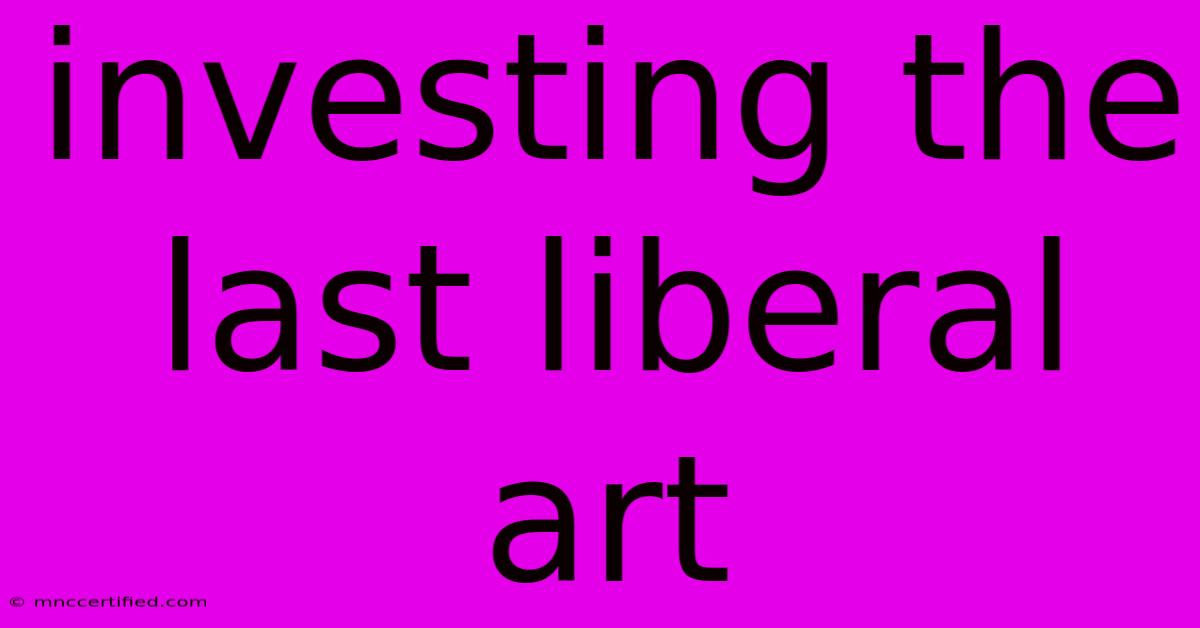Investing The Last Liberal Art

Table of Contents
Investing: The Last Liberal Art
In an increasingly complex world dominated by technology and data, one skill remains surprisingly vital—and perhaps unexpectedly lucrative: investing. While often perceived as a niche pursuit for the financially elite, investing is, in essence, the last great liberal art. It demands critical thinking, historical awareness, psychological resilience, and a nuanced understanding of human behavior – all hallmarks of a well-rounded liberal arts education.
This isn't about day trading or chasing quick riches. This is about cultivating a long-term strategy, informed by a deep understanding of markets, economics, and oneself. It’s about mastering the art of navigating uncertainty and leveraging opportunities, mirroring the problem-solving and analytical skills honed through a liberal arts curriculum.
Why Investing is a Liberal Art
Traditional liberal arts education focuses on developing well-rounded individuals, fostering critical thinking and analytical skills applicable across diverse fields. Investing, surprisingly, aligns perfectly with these principles:
-
Critical Thinking & Analysis: Successful investing demands rigorous analysis of financial statements, market trends, and economic indicators. You're constantly evaluating information, identifying biases, and forming your own conclusions, mirroring the critical thinking skills honed in philosophy or history courses.
-
Historical Awareness: Understanding historical market cycles and economic shifts is crucial. Past performance isn't necessarily indicative of future results, but studying past crises and booms provides invaluable context and helps avoid repeating past mistakes. This mirrors the historical analysis crucial to understanding current events.
-
Psychological Resilience: Investing is a rollercoaster. Market fluctuations will inevitably test your patience and composure. The ability to manage emotions, avoid impulsive decisions, and stick to a long-term strategy is crucial for success. This emotional intelligence is often cultivated through literature, psychology, and other liberal arts disciplines.
-
Communication & Persuasion: Effectively communicating your investment thesis, whether to a potential partner or to yourself, is crucial. Articulating your reasoning clearly and persuasively builds confidence and allows for informed decision-making. This mirrors skills developed through writing, public speaking, and debate.
Beyond the Numbers: The Human Element
Investing isn't just about crunching numbers; it's about understanding human behavior. Market psychology plays a significant role, with fear and greed often driving irrational decisions. Understanding these dynamics, nurtured through studying sociology, psychology, and even literature, can provide a significant edge.
Developing Your Investment "Liberal Arts"
So, how can you cultivate these skills and become a successful investor?
-
Start with Education: Begin with foundational knowledge of finance and investing. Numerous online resources, books, and courses are available, catering to various levels of experience.
-
Embrace Continuous Learning: The investment landscape is constantly evolving. Stay informed by following reputable financial news sources, reading industry publications, and attending workshops or seminars.
-
Develop a Strong Ethical Framework: Consider your values and invest in companies aligned with your ethical principles. This approach combines financial acumen with social responsibility.
-
Practice Patience and Discipline: Avoid impulsive decisions. A long-term investment strategy requires patience and discipline, especially during market downturns.
-
Seek Mentorship: Learning from experienced investors can accelerate your learning curve and provide valuable insights.
Investing: A Journey, Not a Destination
Investing is a lifelong journey of learning and adaptation. It requires a diverse skill set, mirroring the multifaceted nature of a liberal arts education. By combining financial literacy with critical thinking, historical awareness, and emotional intelligence, you can master this last great liberal art and build a secure financial future. This isn't about getting rich quick; it's about building wealth responsibly and sustainably, leveraging the power of knowledge and self-awareness. The true reward lies not just in financial returns but in the intellectual and personal growth it fosters.

Thank you for visiting our website wich cover about Investing The Last Liberal Art. We hope the information provided has been useful to you. Feel free to contact us if you have any questions or need further assistance. See you next time and dont miss to bookmark.
Featured Posts
-
Stla Corporate Insider Trading
Nov 28, 2024
-
United Airlines Teamsters Nationwide Contract Rally
Nov 28, 2024
-
Spotify Wrapped 2024 Official Teaser
Nov 28, 2024
-
Celtic V Club Brugge Champions League Live Stream
Nov 28, 2024
-
Rathdrum Hardware Trading Post
Nov 28, 2024